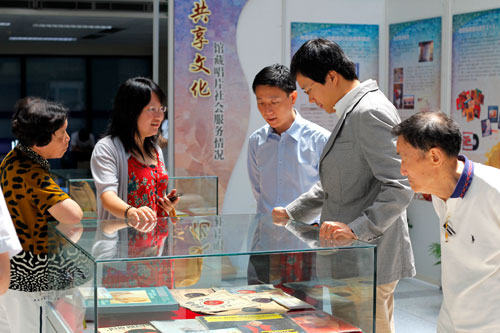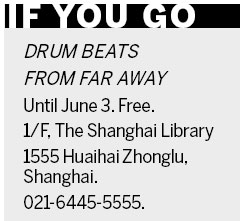
 |
|
Shanghai Library started to collect records from the 1970s and has the country's first record archive department. Gao Erqiang / China Daily |
If you only have time for one musical exhibition, visit Drum Beats From Far Away held at the Shanghai Library where the vintage sound of gramophone records can be felt, heard and seen.
The exhibition presents a wide collection of gramophone records, vintage gramophones and also offers free listening.
It adds to the library's collection of more than 200,000 gramophone records, two thirds of which are foreign.
Shanghai Library started to collect the records from the 1970s and has the country's first record archive department.
According to Zhou Deming, the library's deputy curator, the foreign gramophone records cover music from more than 130 countries.
Of Johann Strauss II's waltz compositions alone, the library has more than 600 works. One of the compositions, The Blue Danube has 115 different versions. While, the library's more than 300 Beethoven works covers all genres, such as symphony, concerto and piano sonata.
Most of the works have various versions played by different orchestras, directors and players. For instance, the library has collected around 80 versions of Beethoven's 5th Symphony in standard play, long play and laser disc. Some of the classical versions include the record played by the NBC Symphony Orchestra directed by Arturo Toscanini, which was published in approximately 1940.
The archive of Chinese records comprises mostly traditional Chinese operas, folk and pop songs. There are also more than 6,000 kinds of Peking Opera records.
But the rarest items in the Chinese section are the "red records". In 1951, the then Shanghai Record Company used iron oxide powder to make the records because of the short supply of carbon black stainer. Therefore, the records produced at that time, which looked dark red, were called "red records".
The library has 20 red records, which features mostly "red songs" such as Youth of the New China and Ode to the Motherland.

In addition, the library also boasts of records of the speeches by Mao Zedong at the Founding Ceremony of New China, the first session of the National People's Congress and speeches by Sun Yat-sen.
Visitors can also listen to classics, which have been converted to digital versions.
"We kept the exact sound of the old records, which are sometimes coarse, so that listeners can feel the original flavor of the vintage records," says the head of the record archive department, surnamed Gu, who would not give her full name.
She says to date, they have only converted more than 7,000 records to digital versions because of the complicated process.
"It will take three to five years to complete the conversion project. By then, we will have a complete database for which can keep the vintage sounds forever," she says.
yangyijun@chinadaily.com.cn